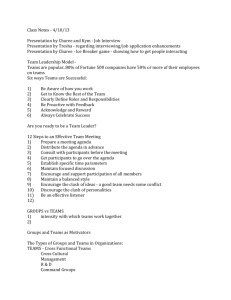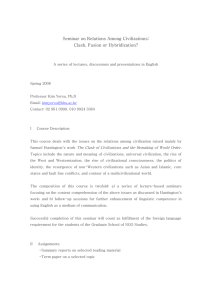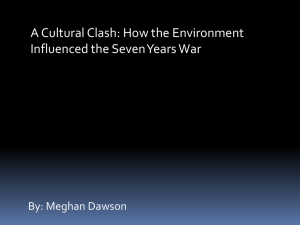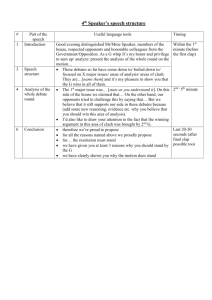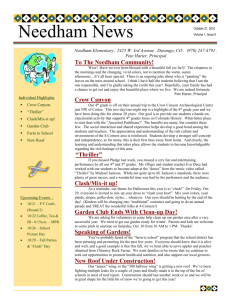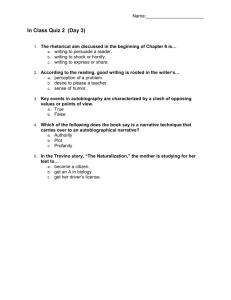Humanity at the Edge
advertisement
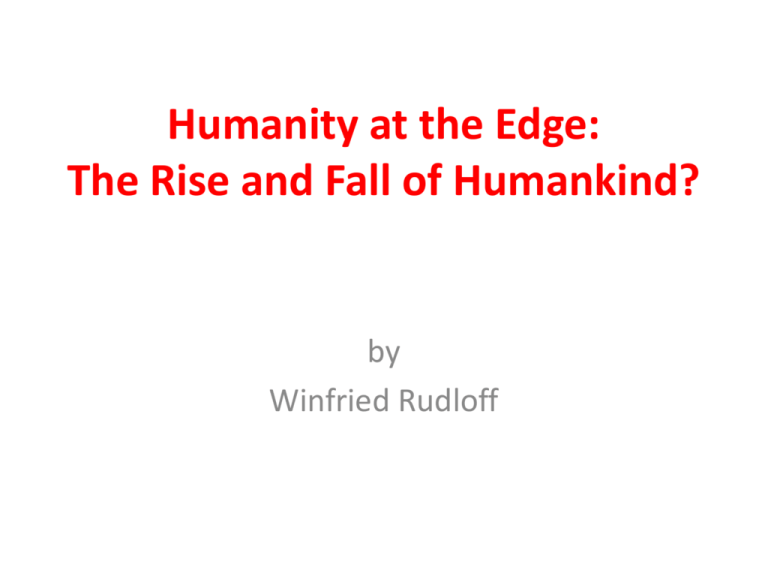
Humanity at the Edge: The Rise and Fall of Humankind? by Winfried Rudloff We are at a decisive crossroad. Human knowledge has reached heights never thought possible before. One should recognize that knowledge in itself is neutral. However, it is the dualism in humanity that forces us to apply our knowledge for good or for evil. In this part of the core curriculum the student will be exposed to the dualism in nature and in human behavior that are important in the assessment of humanity's future survival. • The two faces of Janus: Atomic energy or atomic destruction? • Programming the mind for good or evil? • Genetic Engineering: Homunculus or a way to improve our quality of life? • The science of destruction: Chemical warfare and high-tech terrorism or benevolent knowledge in medicine leading to a better future? • The world: Clashing of the cultures or a melting pot of humanity's ideas? • Is there a future for the human dinosaur? Rudloff, Winfried:http://www3.govst.edu/w-rudloff/janusfaces.pdf http://www.phinnweb.org/neuro/brainwash Rudloff, Winfried: http://www3.govst.edu/w-rudloff/HumanInteraction.pdf APPENDIX I Interview of Arab-American Psychologist Wafa Sultan, Ph.D. on Al-Jazeera TV (Qatar) February 21, 2006 • Wafa Sultan: The clash we are witnessing around the world is not a clash of religions or a clash of civilizations. It is the clash between two opposites, between two eras. It is a clash between a mentality that belongs to the Middle Ages and another mentality that belongs to the 21st Century. • It is a clash between civilization and backwardness, between the civilized and the primitive, between barbarity and rationality. It is a clash between freedom and oppression, between democracy and dictatorship. It is a clash between human rights, on the one hand, and the violation of these rights, on the other hand. • It is a clash between those who treat women like beasts, and those who treat them like human beings. • What we see today is not a clash of civilizations. Civilizations do not clash, but compete. • Moderator: I understand from your words that what is happening today is a clash between the culture of the West and the backwardness and ignorance of the Muslims? • Wafa Sultan: Yes, that is what I mean. • Moderator: Who came up with the concept of a clash of civilizations? Was it not Samuel Huntington? It was not Bin Laden. I would like to discuss this issue, if you don’t mind… • Wafa Sultan: The Muslims are the ones who began using this expression. The Muslims are the ones who began the clash of civilizations. The Prophet of Islam said: “I was ordered to fight the people until they believe in Allah and His Messenger. • When Muslims divided the people into Muslims and Non-Muslims, and called to fight the others until they believe in what they themselves believe, they started this clash, and began this war. In order to stop this war, they must reexamine their books and curricula, which are full of takfir and fighting the infidels. • My colleague has said that he never offends other people’s beliefs. What civilization on the face of this earth allows him to call other people by names they did not choose for themselves? Once he calls them Ahl AL-Dhimma, another time he calls them “People of the Book,” and yet another time he compares them to apes and pigs, or he calls the Christians “those who incur Allah’s wrath.” • Who told you they are “People of the Book”? They are not the People of the Book; they are people of many books. All the useful scientific books that you have today are theirs, the fruit of their free and creative thinking. What gives you the right to call them “those who incur Allah’s wrath,” or “those who have gone astray” and then come here and say that your religion commands you to refrain from offending the beliefs of others? • I am not a Christian, a Muslim, or a Jew. I am a secular human being. I do not believe in the supernatural, but respect others’ right to believe in it. • Imam: Are you a heretic? • Wafa Sultan: You can say whatever you like. I am a secular being who does not believe in the supernatural… • Imam: If you are a heretic, there is no point in rebuking you since you have blasphemed against Islam, the Prophet, and the Koran…. • Wafa Sultan: These are personal matters that do not concern you. Brother, you can believe in stones as long as you don’t throw them at me. You are free to worship whoever you want, but other people’s beliefs are not your concern, whether they believe that the Messiah is God, son of Mary, or that Satan is God, son of Mary. Let people have their beliefs. The Jews have come from the tragedy (of the Holocaust), and forced the world to respect them with their knowledge, not with their terror, with their work, not with their crying and yelling Beyond Technology: High Technologies and Their Social Impact. Scientists all over the globe are trying to find appropriate solutions to current economic, resource-related, political, social, biological, and other problems. As cases in point, here are some themes of current urgency: • • 1. Identification and promotion of economic alternatives to deforestation of the rain forest • 2. Rewarding families for having fewer children or heavy fines/taxes for more than one child (China) • 3. What are the issues and problems of genetic engineering? • 4. Searching for alternatives to resource distribution • are a few of those problems that have to be solved on a global scale. The following topics reflect some of the concepts of future-oriented significance that can be researched by our students as part of the integrative studies curriculum: • The study of current research in science, technology, and medicine: Beyond the Club of Rome: The Gaia Hypothesis (Lovelock, T. & Margulis, L, 1996). • The emerging science of self-organizing, evolving, complex, adaptive systems: a brewing intellectual revolution; from chaos to order or from order to chaos? • The Mind-Body Problem from the viewpoints of computer science, cognitive science, philosophy, and modern physics. • Science and mysticism. • Science and art. • Mathematical and computer modeling in the humanities and social science • The past, present, and projected future of science and society: Technology assessment, technological forecasting, and futurology. • Social implications of information technology. The Problem of Space • As far as we know, humankind evolved in an environment that is unique in our galaxy. This environment is very sensitive to man-invoked changes as our recent studies of the ozone layer, and more generally, our biosphere has shown. Desertification of our arable lands is progressing at an alarming rate. • This part of the core curriculum is designed to make the students aware of the potential of an avalanche effect that may flip-flop our environment into a global catastrophe if we continue to destroy our biosphere with unchecked growth and exploitation of our resources. Our students should be trained to think globally but act locally to shape the future of our children. Here are again some intriguing themes: • Humanity's impact on the environment: What have we done to mother Earth! • Are we polluting our lives away: Poisons in the atmosphere, in our waters and our grounds. • Overpopulation, expansion of arid lands through unplanned deforestation. Is world starvation at hand? • Our resources are finite: Recycling as one solution against waste and the squandering of our resources. • The Club of Rome and world models of the future (Meadows, D. H. et al., 1972; Mesarovich, M. & Pestel, E., 1974; Tietenberg, T., 1992) • The chance effect of galactic destruction: Can life on Earth again be destroyed by a collision with a heavenly body? What can we learn from the recent asteroid collision with planet Jupiter? • The ecological balance (or imbalance). Let’s keep it intact. • Resources from the seas: Mining the bottom of the oceans; aquatic biology & chemistry.
